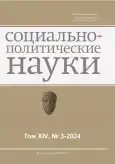Some aspects of ensuring internal security of Russia at the present stage of development of civilizations
- Authors: Bolgov N.V.1, Chichulin N.A.1, Shevtsov V.M.1
-
Affiliations:
- Zhirinovsky University of World Civilizations
- Issue: Vol 14, No 3 (2024)
- Pages: 33-38
- Section: Political Institutions, Processes and Technologies
- URL: https://journals.eco-vector.com/2223-0092/article/view/635461
- DOI: https://doi.org/10.33693/2223-0092-2024-14-3-33-38
- EDN: https://elibrary.ru/IHLXES
- ID: 635461
Cite item
Abstract
The article examines some aspects of ensuring Russia’s internal security at the present stage of the development of civilizations. The purpose of the study is to identify the impact of internal threats, including terrorist ones, on the national security of the country. This is necessary for a fundamental revision of state policy, scientific apparatus and clarification of the fundamental conceptual documents on ensuring security from internal threats. Conclusions. As a result of the conducted research, the authors conclude that at present, the increase in threats emanating from individual countries and affecting the security of the Russian Federation is not decreasing but continues to increase. Means of economic, political, diplomatic, and informational pressure are actively used against Russia to exacerbate the inter-civilizational conflict, delegitimize it within the international community and destabilize the political situation inside the country, which can lead to the loss of identity and cultural and historical heritage. The social contradictions that arise in society lead to the emergence of protest activity of citizens, which must be controlled by state and public security institutions. The emphasis is placed on the need for timely changes in the legal framework governing anti-terrorist activities. Based on the results of the analysis, problems of organizational and legal regulation have been identified that require the elimination of negative factors at the state level. Proposals are being made to improve anti-terrorist activities in Russia and the need for a set of measures to ensure its legal support, as well as the use of existing potential.
Keywords
Full Text
About the authors
Nicolay V. Bolgov
Zhirinovsky University of World Civilizations
Email: 4182803@mail.ru
SPIN-code: 1882-8592
Dr. Sci. (Polit.), Cand. Sci. (Econ.); leading researcher
Russian Federation, MoscowNikolay A. Chichulin
Zhirinovsky University of World Civilizations
Email: nikolay.chichulin@yandex.ru
SPIN-code: 1798-9099
Dr. Sci. (Polit.); leading researcher
Russian Federation, MoscowValery M. Shevtsov
Zhirinovsky University of World Civilizations
Author for correspondence.
Email: v.m.shevtsov@uwc-i.ru
SPIN-code: 1904-5409
Dr. Sci. (Philos.), Professor; advisor to the Rector
Russian Federation, MoscowReferences
- Belaya E.V. The phenomenon of terrorism in modern society. Dis … of Cand. Sci. (Sociol.). Moscow, 2005. P. 34.
- Bolgov N.V., Baal N.B. Political extremism in the post-Soviet space and in Russia as a threat to its military security. Military Thought. 2021. No. 1. Pp. 22–33. (In Rus.)
- Bulavina M.A., Novoselsky S.O. The role of higher education in ensuring the national security of the Russian Federation in the context of the crisis of international relations. In: Trends in the development of the system of international relations and their influence on the management of the national defense of the Russian Federation. Moscow, 2023. P. 76–83.
- Dudin M.N. Protest sentiments and the standard of living of the Russian population: A brief empirical analysis. Power. 2022. Vol. 30. No. 1. Pp. 9–16. (In Rus.)
- Ermakova L.I., Gorbunov A.P., Chagilov V.R. Geopolitics in the system of international relations. Bulletin of Pyatigorsk State University. 2021. No. 4. Pp. 62–64. (In Rus.)
- Klevtsov K.K. The concept and legal essence of international cooperation in the field of criminal justice. Justice of the Peace. 2023. No. 4. Pp. 8–12. (In Rus.)
- Kokoshin A.A. Strategic management: theory, historical experience, comparative analysis, tasks for Russia. Moscow: MGIMO, 2003. 528 p.
- Maximov N.R. Some features of the emergence and course of mass riots and civil disobedience actions in modern conditions. In: Law and order in Russia: Problems of improvement. Collection of scientific papers of the XVII All-Russian Scientific and practical conference. Moscow, 2023. Pp. 222–225.
- Morozov Yu.V. Hybrid war of the USA against Russia and China. In: The strategic Triangle of the USA–China–Russia: Challenges and prospects for Russia’s security. Moscow, 2022. Pp. 260–277.
- Novoselsky S.O., Moiseeva O.A., Filippova O.A. Communication policy of executive authorities with the population in social networks. Questions of Political Science. 2023. Vol. 13. No. 3 (91). Pp. 1001–1013. (In Rus.)
- Pogrebnyak K.V., Galimovich V.A., Malashevskaya O.V. The threat of terrorist acts. In: Ensuring the safety of life at the present stage of society development. Materials of the Republican student scientific and practical conference. V.N. Bosak (chief ed.). Gorki, 2022. Pp. 84–85.
- Prokhorov A.E. The influence of domestic political interests on the geopolitical and global space. In: Per aspera ad astra – Through thorns to the stars. Collection of scientific articles of international scientific student hearings “Law. Economy. Management”. Stavropol, 2021. Pp. 134–137.
- Shukshin V.S., Suvorov V.L. The policy of indirect actions as a threat to Russia’s security in the conditions of the new Cold War: Monograph. Moscow: IPO at the Nikitsky Gate, 2017. 175 p.
Supplementary files








